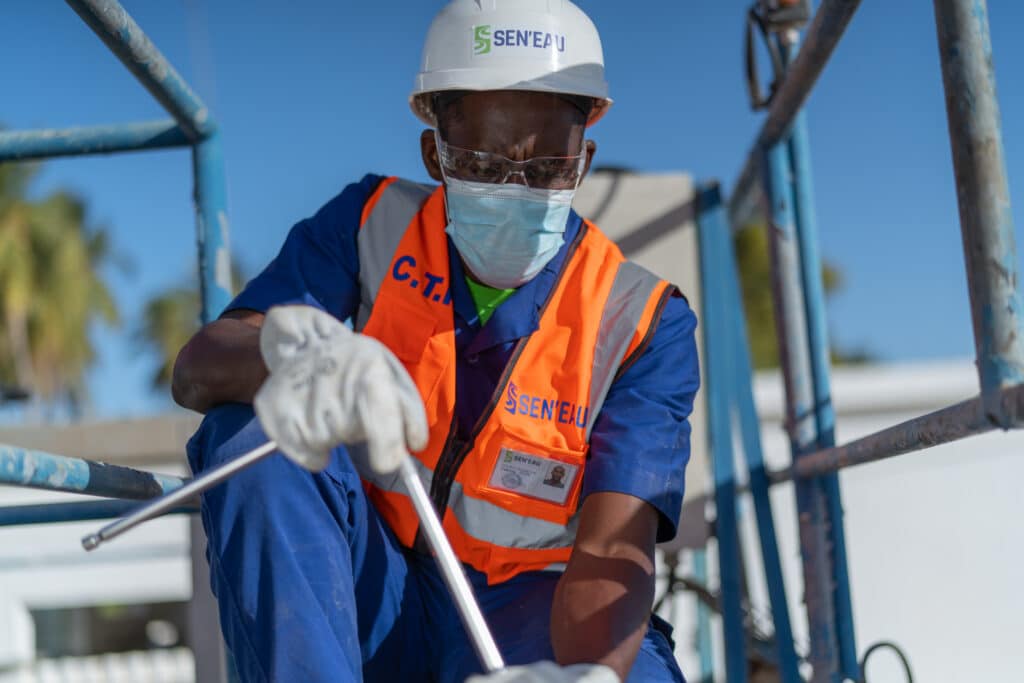[PARTNER ARTICLE] From Algiers to Dakar, via Casablanca and Cairo, SUEZ has made a major contribution to improving water management in Africa over the past few decades. As part of its service contracts, SUEZ trains young people and African professionals in the water and sanitation sector. The Group pays particular attention to the development and career advancement of all its employees and has set up specific programmes dedicated to women, young people and seniors, among others.
Know-how transfer in Algeria thanks to the WIKTI® tool
In Algeria, the transfer of skills is the basis of SUEZ’s work with professionals from the Société des eaux et d’assainissement d’Alger (SEAAL). As part of its management contract with the Algerian public company, SUEZ is helping local teams to improve their skills individually and collectively. Thus, more than 200,000 days of training have been provided to SEAAL technicians, engineers and managers since 2006.
Read also Reuse of treated wastewater: North Africa and SUEZ set an example
This progress has also been made possible thanks to the WIKTI® (Water International Knowledge Transfer Initiative) tool. This is an innovative and comprehensive management tool, allowing the transfer of SUEZ know-how to operational teams in the field. “It is based on a segmentation of activities (water, sanitation, customer management, but also managerial know-how) into 42 basic professions and the evaluation of the initial individual and collective level, followed by adapted training plans. As a result, the number of expatriates has been reduced from 27 full-time experts initially, to 13 today, and only three in management positions,’ says Suez.
Training young people and women in Casablanca
In Casablanca, Morocco, the group has been managing the distribution of drinking water and electricity, sanitation and public lighting through its subsidiary Lydec since 1997. The company places local professional training at the heart of its strategy. Thus, Lydec carries out approximately 80,000 hours of training per year, of which more than 70% is oriented towards trades, health and safety at work.
In addition to training in the water sector in Morocco, Lydec has implemented a strategy aimed at diversity and equal opportunities through the insertion and integration of young people, women and people with reduced mobility. Through training, coaching and mentoring, Lydec wishes to strengthen the presence of women in its administration. Also, “encouraging collective learning by developing professionalization paths allows us to ensure a transfer of know-how between generations and is part of a learning company approach,” says SUEZ.
A partnership for training young people in water-related professions in Senegal
SUEZ, via the company SEN’EAU, of which it is the technical partner of reference, has been managing water in urban and peri-urban areas of Senegal for a year. But its achievements in terms of training and employability of young people are already very noticeable. During this period, SEN’EAU has recruited 198 young people under the age of 35.
In line with the spirit of the Senegalese government’s Emerging Senegal Plan, which aims to accelerate vocational training for young people, SEN’EAU has signed a partnership with the Sectoral Centre for Vocational Training in Construction and Public Works (CSFP-BTP). The implementation of this partnership is in line with the principle of “School-Company” alternating training to allow learners to discover the reality of the professional environment in an approach that takes into account the needs and capacities of SEN’EAU. The first class of 30 young people started in March 2021. At the end of the 3-year training course, its professionals will join SEN’EAU and its partner companies.
The creation of a centre of excellence and innovation in the water sector
SEN’EAU is also preparing to set up a centre of excellence and innovation in the water sector. This establishment will be set up in partnership with Cheikh Anta Diop University, the Polytechnic School of Thiès, AgroParisTech, the National Conservatory of Arts and Crafts (CNAM), the IAE Paris Sorbonne and the Institute of Research for Development (IRD). It will be “the group’s first centre of excellence and innovation in Africa. The centre will be positioned at the heart of Senegal’s academic and scientific life. SUEZ, by contributing its expertise and relying on its network of researchers, will give it momentum and participate in the creation of an innovative ecosystem made up of operational teams, researchers, academic partners, SMEs (small and medium-sized enterprises) and start-ups”, says SUEZ. The centre will thus enable capacity building for local managers, with a view to optimising the performance of the water and sanitation service in Senegal.
Capacity building for municipal leaders and decision makers
The “Water for All” Chair, co-founded in 2009 by the SUEZ Foundation, Agro-ParisTech and MinesParisTech, offers a specialised master’s degree each year to some forty managers of urban drinking water or sanitation services, combining managerial knowledge with strategic and operational skills. Nearly 190 water and wastewater service professionals from 48 countries have been trained thanks to the Chair.
Read also The power of decentralised solutions: water, now, everywhere in Africa
Overall, SUEZ invests in learning technical skills, empowering and increasing the collective skills of public entities and preparing decision-makers in the water sector for management. The environmental management specialist is thus contributing to the organisation of water management, a vital sector for the development of the African continent.
Local roots are at the heart of SUEZ’s strategy and this is achieved through national teams in each country, but also through partnerships and integration into the economic, associative, academic and innovation ecosystems of each country, whether in Morocco, Algeria or Senegal, but also in Asia, America and everywhere the Group operates.
Article produced in partnership with SUEZ
